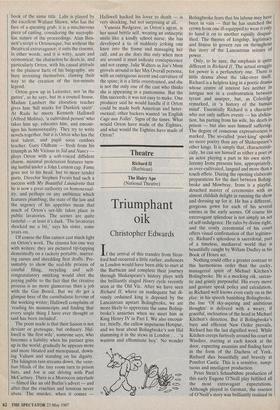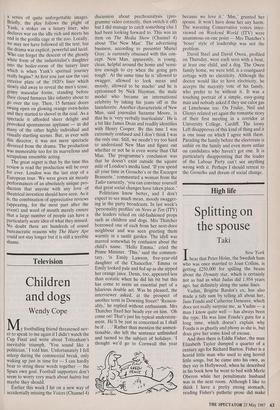Theatre
The Hairy Ape (National Theatre) Richard H (Barbican)
Triumphant oik
Christopher Edwards
If the arrival of this transfer from Strat- ford had occurred a little earlier, audiences in London would have been able to start at the Barbican and complete their journey through Shakespeare's history plays with the brilliantly staged Henry cycle recently seen at the Old Vic. After we have seen Richard II, where an inadequate but di- vinely ordained king is deposed by the Lancastrian upstart Bolingbroke, we are more likely to appreciate the same Boling- broke's anxieties when we meet him as King Henry IV in Part I. We also encoun- ter, briefly, the callow impetuous Hotspur, and we hear about Bolingbroke's son Hal slumming it in the stews in London . . . 'a wanton and effeminate boy'. No wonder Bolingbroke fears that his labour may have been in vain — that he has snatched the crown from one ill-equipped to wear it only to hand it on to another equally disqual- ified. The themes of kingship, legitimacy and fitness to govern run on throughout this story of the Lancastrian seizure of power. Only, to be sure, the emphasis is quite different in Richard II. The actual struggle for power is a perfunctory one. There is little drama about the take-over itself. Richard is a helpless king in a poetic drama whose centre of interest lies neither in intrigue nor in a confrontation between tyrant and usurper, but, as Coleridge remarked, in 'a history of the human mind'. Essentially Richard is a character who not only suffers events — his abdica- tion, his parting from his wife, his death in prison — but also sees himself suffering- The degree of conscious expressiveness is marked. The so-called 'poet-king' speaks no more poetry than any of Shakespeare's other kings. It is simply that, characteristi- cally, he can see himself as either a poet or an actor playing a part in his own story. Jeremy Irons presents him, appropriately, as over-cultivated, languid and more than a touch effete. During the opening elaborate preparations for the duel between Boling- broke and Mowbray, Irons is a playful, detached master of ceremonies with an almost childish delight in running the show and dressing up for it. He has a different, gorgeous gown for each of his several entries in the early scenes. Of course his extravagant splendour is not simply an act of self-indulgence. He rules by divine right, and the costly ceremonial of his court offers visual confirmation of that legitima- cy. Richard's splendour is sacerdotal, part of a timeless, mediaeval world that is beautifully caught by Willam Dudley in his Book of Hours set.
Nothing could offer a greater contrast to this harmonious order than the cocky, managerial spirit of Michael Kitchen's Bolingbroke. He is a mocking oik, sarcas- tic and grimly purposeful. His every move and gesture speak policy and calculation, as Richard well knows even early on in the play; in his speech banishing Bolingbroke, the line 'Of sky-aspiring and ambitious thoughts' is deliverd with a weary, if graceful, inclination of the head in Michael Kitchen's direction. But if Bolingbroke's busy and efficient New Order prevails, Richard has the last dignified word. While Kitchen creeps furtively around his court at Windsor, starting at each knock at the door, expecting assassins and finding farce in the form of the Duchess of York, Richard dies beautifully and bravely at Pomfret Castle. This is a sensitive, sump- tuous and intelligent production.
Peter Stein's Schaubiihne production of this early Eugene O'Neill play fulfilled all the most extravagant expectations. Although played in German, the essence of O'Neill's story was brilliantly realised in a series of quite unforgettable images. Briefly, the play follows the plight of Yank-, a stoker on a luxury liner, who declares war on the idle rich and meets his end in the gorilla cage at the zoo. Locally, we may not have followed all the text, but the drama was explicit, powerful and lucid. Who can forget the descent of the ghostly White form of the industrialist's daughter into the boiler-room of the luxury liner which is when Yank's spiritual journey really begins? At first you just saw the vast exterior plate of the 1920's liner which slowly slid away to reveal the men's tense, grimy muscular forms, standing before their closed furnaces like infantry about to go over the top. Then, 15 furnace doors swung open on glowing orange oven-holes and they started to shovel in the coal. As a spectacle it afforded sheer delight and provoked spontaneous applause — as did many of the other highly individual and visually startling scenes. But, as ever with this director, it was not mere spectacle divorced from the drama. The production was memorable too for its marvellous and scrupulous ensemble acting.
The great regret is. that by the time this review is read the production will be over for ever. London was the last stop of a European tour. We were given six measly performances of an absolutely unique pro- duction that anyone with any love of theatrical invention should have seen. As it is, the combination of appreciative reviews (appearing, for the most part after the event) and word of mouth merely ensure that a large number of people can have a particularly acute idea of what they missed. No doubt there are hundreds of sound bureaucratic reasons why The Hairy Ape could not stay longer but it is still a terrible shame.










































































 Previous page
Previous page